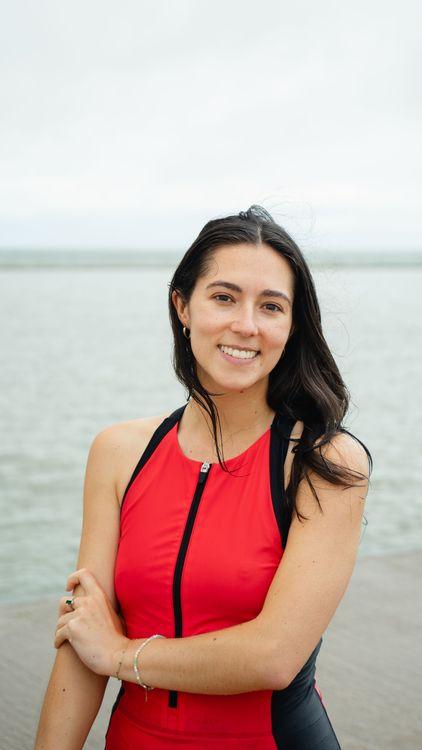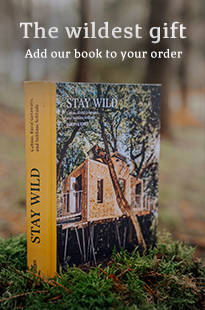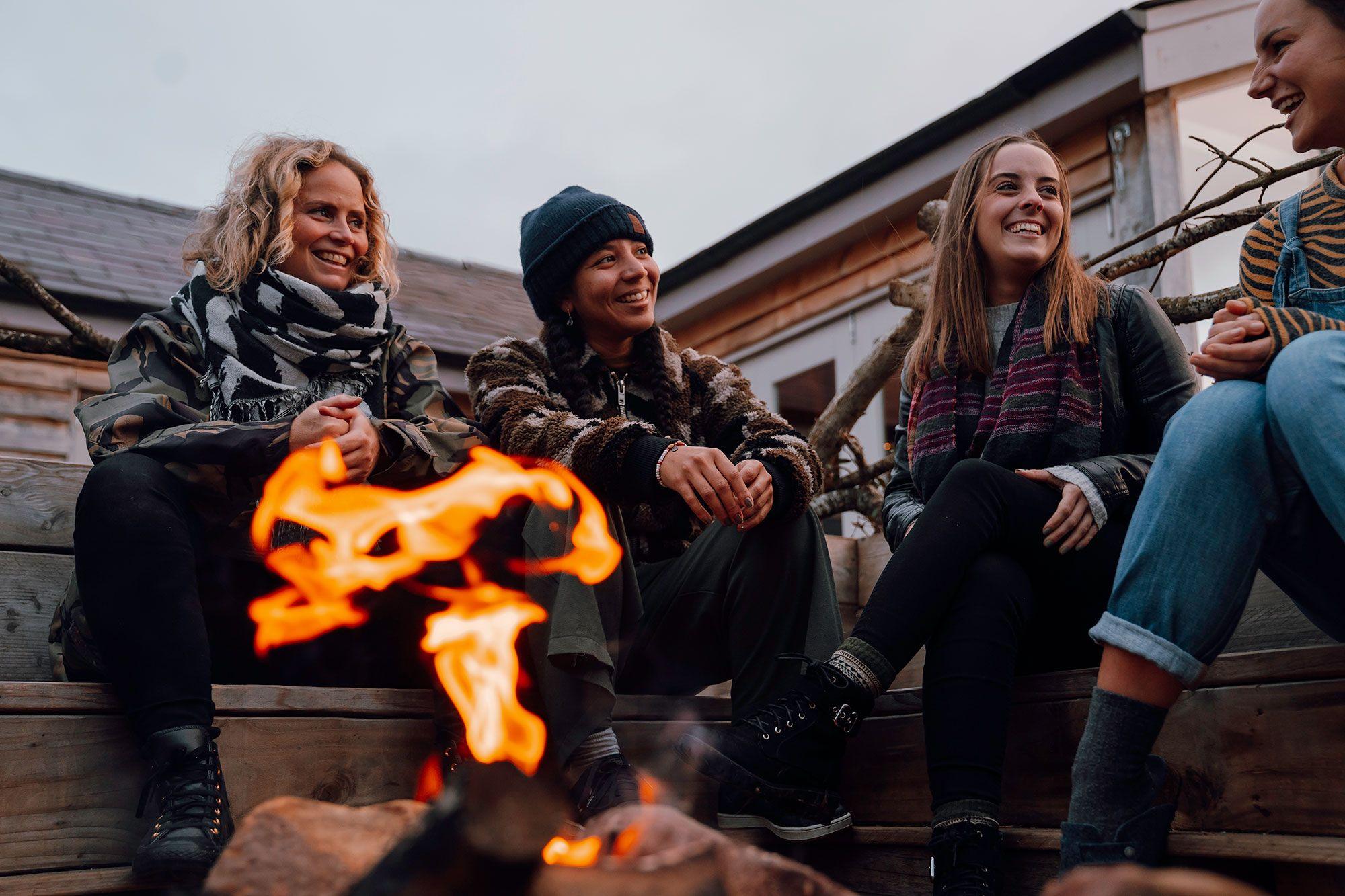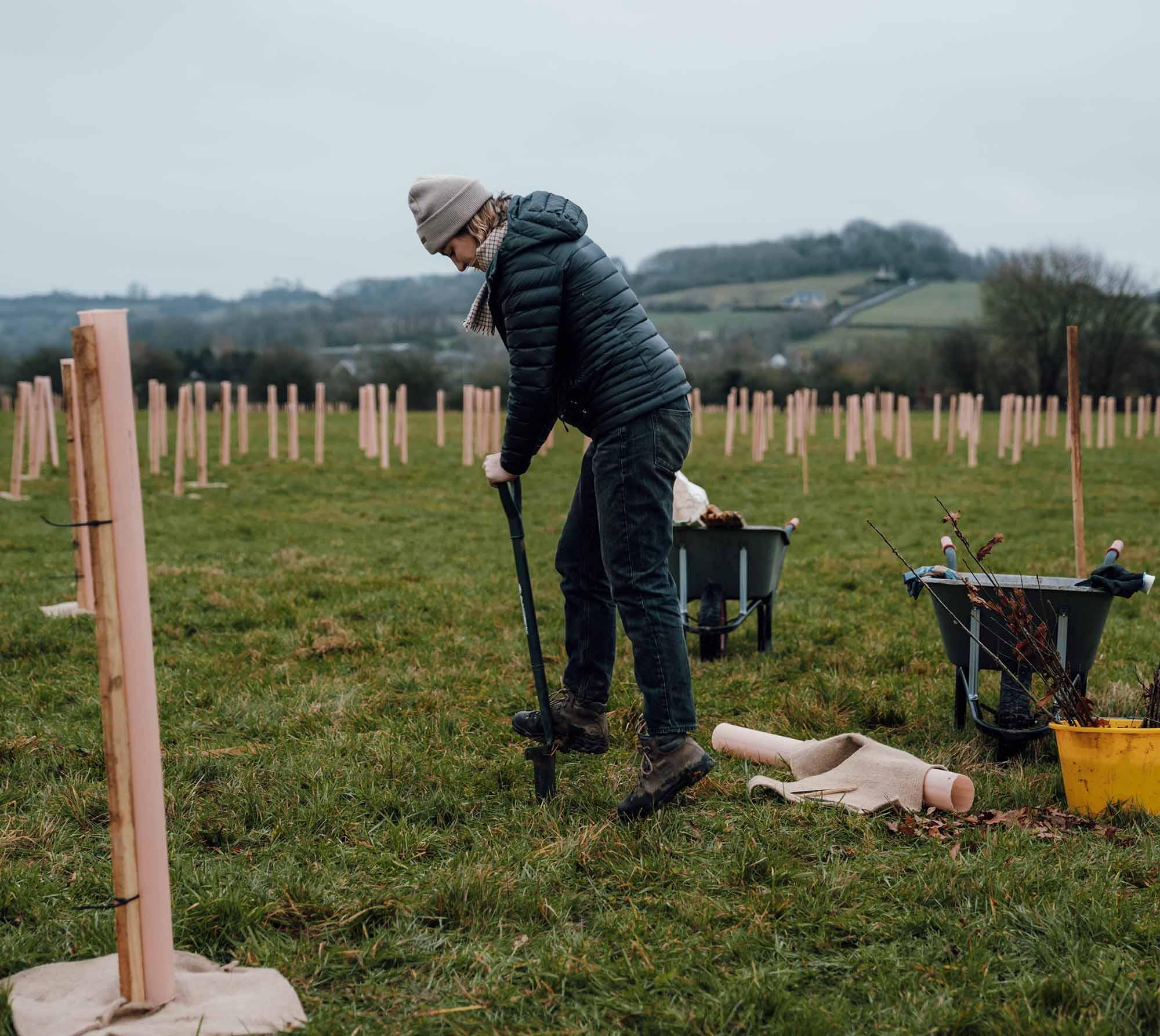- Location
- Glamping
Special occasions
- Stories
- Gift Cards
- About us
About Canopy & Stars
More from Canopy & Stars
More at Sawday's

A Life More Wild - Series 3 Episode 8
Freya Bromley
Freya Bromley on her mission to swim every tidal pool in Britain, and finding healing within the water
Welcome to A Life More Wild, a podcast in which we explore people's connection to nature on walks in the great outdoors. In this episode, you're out at the tidal pools in Margate with Freya Bromley.
When Freya first discovered tidal pools, she was dealing with the turmoil of grief. Those patches of calm water surrounded by volatile seas felt like places of refuge. From a single experience came a mission to swim every tidal pool in Britain, but while she originally went looking for healing, she found so much more.
I always bring a swimsuit! Me and my friend went to Stonehenge for solstice, which was a lovely trip, and we brought swimsuits and on the way found somewhere to stop and have a swim in a river. It's nice being able to be spontaneous like that.
The first time I get in, I always think, why is this my hobby? I'm not one of those people that jump straight in. But I think something good about swimming is that you always feel very courageous after I feel like my relationship with myself has changed a lot since I became a swimmer. Because I feel like I'm quite a brave person. There's something good about getting in the water. Every time feeling like you've achieved something and that initial moment of discomfort is always replaced by an amazing feeling. You always feel better after a swim.
Margate has two tidal pools. We're currently at Marine Terrace and we're going to walk around the beach past Turner Contemporary Gallery, along the seafront there where there's kind of a sheltered pathway and about 30 minutes to the second tidal pool, which is Whirlpool Bay. Whirlpool Bay is actually Britain's largest tidal pool. It's huge and has this amazing concrete structure around it to kind of pen you into the sea. It's such a beautiful swim, because however stormy or wild the sea is, you're protected.
I think for many people the sea can be quite a scary place, which it is, but here you're in somewhere that can feel quite still. And it's amazing to be close to the elements like that, while you're in this kind of safe haven. On that walk, we're gonna go on path but also the beach. There's lots of people here enjoying the sea today, even though it's a cloudy day. And I really love that. I think that's something that's always been really nice to me about swimming, is that swimming is full of people that are out in nature, whatever the weather, trying to do something to make themselves feel... well to brighten their day a little bit.
it's quite a grey day, but not too far in the distance there's a strip of clear, almost yellow sky. The weather seems to move quite quickly here. So it's a nice space to spend a few hours especially after a swim. You might be putting on your socks while it's raining and then in not too long the sun can come out. I guess that's the beautiful thing about being on the coast, is being exposed to the elements.
Some days when you're here, it's so blue and so clear and when you look out, you kind of almost can't tell where the sea begins and where the sky ends. Today that's kind of the same but for a different reason, because it's so grey! But you get an amazing view here. It seems almost infinite. Sometimes the illusion that the boats and the ferries in the distance are floating above the water.
Some children are crabbing and they've got something. Reeling in what looks like a big catch. I used to do crabbing, rockpooling, a lot of that when I was younger, like most of us. I think that's one of the nice things about being by the sea is it connects you to something very childlike. It's often a place to be playful, have a splash around, play games, I think especially for me after grief that felt quite important. I felt like quite a serious person for a long time and being in the sea was a little bit of an antidote to that, a return to something more innocent.
I'd been looking for a swim that wasn't too far from London and stumbled across a tidal pool in Margate. So we got on the train, came here, and not far from the station was Marine Terrace tidal pool. It's an old boating pool, so it's quite shallow. But if anything that kind of makes it more fun, because you get in and you have a paddle and you get that rush of cold water. After a lovely day, I came home and didn't really think much of it, until I saw a photo online of Whirlpool Bay tidal pool, Margate. It was huge and I thought, that definitely wasn't where we swam. So I realised that Margate has not one, but two tidal pools and the first time we'd come here we'd swum in the wrong one.
Some people here call that first tidal pool Marine Terrace or locals pond or the boating pool. But between between the two, is only a 30 minute walk and I've always felt very envious that Margate has two tidal pools. Without the thrill of arriving on that first day, maybe I wouldn't have even bothered to swim in that first one if we'd not accidentally stumbled across it.
So I went on a journey over a year trying to swim in every tidal pool in Britain with my best friend. And I wrote a book about that adventure. Lots of them we found quite easily online. Lots of them seemed to be hiding. So I spent a lot of time on Google Maps satellite view, just going around the coast in different parts of the UK, trying to see if I could find any. And I guess it was kind of ironic that a big part of why I was so drawn to swimming was it was a way to keep me off my phone, off my computer, be outdoors in the elements, be with nature. But then really what connected me a lot to different people into swimming was research online. So I found huge amounts of information on Facebook groups or on Instagram, people would message me and say, have you been to this one on the west coast of Scotland, or in this one in Dumfries and that kind of community felt really positive.
I think social media gets a bit of a reputation as maybe not always being very helpful, but actually, I met lots of amazing kind people. And when I was travelling, we'd often meet up and it was a fantastic way to meet strangers. So I swam in 36 tidal pools all around the UK. And it became less about collecting these pools or historic information about them and more about meeting people and feeling welcomed into their communities. And I suppose really, the thing that was the same in all of them is that people swim for a reason. I remember somebody at Clevedon Marine Lake in Bristol said to me, everyone has a story, everyone has a story for why they swim. And for me, I'd started swimming after my brother Tom had died. The only thing that gave me any peace at that time was the water.
And actually looking back it was also probably that lots of swimmers tend to be women. When I'd started swimming, I'd been swimming at the lady's pond in Hampstead Heath and maybe needed that maternal hug, that sense of being encased in a community or there being people that were looking out for me. I think that was the same for lots of people I met. Everybody was swimming because they'd had a breakup or a divorce or they'd lost someone or they had a mental health issue they were struggling with. That became quite nice, because when you're at the poolside and somebody offers you, you know, a sip from their flask of coffee, or they press their hot water bottle against you or offer you their towel. They're really saying, I'm out here too, I'm trying to make the best of things. So whether it's raining or it's windy, I'm out and I'm doing this thing that's good for me and I can see that you are low too. Maybe they're just swimming! Maybe that's the writer in me searching for meaning in everything where there isn't any, but that's what I've kind of taken it to mean and it's been very special to me. I've met a lot of people that have said swimming saved their life and I really do believe that.
It's starting to rain now, kind of a light mist. So the horizons blurring a bit, but it makes everything feel quite romantic. That was also a nice thing about meeting my partner. At first he was probably one of the first people that, when we started dating, our dates weren't always in pubs or restaurants or to do with drinking or being out, they were walks or going for swims or being outside. That was a nice way to fall in love.
When you first get in the water, it's so bracingly cold that it really takes your breath away. That's the moment where a lot of people panic. Because it can just feel so incredibly shocking. It really grips you. I often feel it at the back of my neck as well, this kind of tensing at first. But if you push past that for just a moment, a deep exhale is really all it takes. Then you reach this amazing calm, this total clarity, because while your body is getting used to the water, and the temperature, everything else just melts away. It's kind of like an anaesthetic. It's so numbing, you just reach this absolute calm. And if you're somebody that has a very busy mind, you're always thinking about things, which I guess is just all of us. That kind of clarity, I've never found another way to have that kind of same sensation. It's totally addictive.
I don't know if it's all people or maybe, particularly British people. But it can be a bit hard to show emotion sometimes. Especially emotions that we deem bad or ugly, like guilt, or anger or grief. I certainly felt like I couldn't express them for a long time. So they were all just kind of trapped inside me. And I think there's something about the intensity of cold water that felt like it somehow matched all of these feelings inside me. It was somehow the only way I could compare grief. It was also one of the only ways that I could maybe be close to expressing anger. I'm not sure that we really know how to do that. I remember when I first met my partner, we'd been on a few dates, and we'd gone to the Hampstead ponds. And he said, sometimes I put my head underwater and kind of scream as loud as I can and no one can hear. At the time, I thought that was crazy. Because I thought, we're not supposed to do that. We're not supposed to be angry, we're not supposed to scream. And I recommend that to people all the time now. I think if there's something inside you being able to go outside on a windy blustery day, and put your head under into freezing cold water and scream, we all need a bit of that.
The seagulls here have this part of the beach to themselves today. All the families are down near the train station. I've had a few friends that have said to me, well, I'm not very confident with swimming, I find it quite scary. And I think that's fair, the sea is terrifying - rip tides and currents. And you know it can be really dangerous. Whereas in a tidal pool, you're completely secluded, you're safe, you've got these boundaries on the site. So you can experience something as intense as the sea, but you're protected. I think, looking back on my journey or maybe kind of obsession, going to visit all these tidal pools, probably subconsciously that was why I was so drawn to them. Because grief was this feeling that felt like it might sweep me away at any moment. It felt completely unbounded. Then suddenly, there was a way to dip my toes in, for it to feel like it was contained somehow. And I've really learned that, you know, if you start crying, if you start feeling an emotion, it is going to stop eventually. I sometimes worried if I met my grief, what would happen. If I ever wouldn't come back from that place. And there's always edges, there's always a limit to these things. I suppose that's always felt like there's been quite a lot of symmetry there, with that and the sea, for me especially. Now just looking at the wall of the tidal pool. It's such a clear boundary, covered in seaweed and algae. But then when it slips into the sea, it's completely gone.
I think that's a really important part of swimming, being able to swim in the waters around you where you grew up, where your parents grew up. I met people on the east coast of Scotland in a pool called the Twinkie and a woman there was teaching her granddaughters to swim and she said her grandmother taught her how to swim there. There's this sense of people passing something on, a connection to the place around them. It's really important to remember that these places belong to us - the sea, the tidal pools, they're part of a shared history and a part of shared community, which I think is so important. I think a lot of people connected to that again in lockdown, which has been something really special.
When I was finishing up the book, I did have a period of real stress, where people would message me on Instagram and say, I found another tidal pool. And my year of this challenge I'd set myself, to swim all of them, was running out. Maybe this is a bit of a plot spoiler for the book, but, you know, I couldn't swim all of them, I kept finding more. And I realised that that wasn't what the challenge was about. Maybe I'd set out to do this thing, to swim in all these tidal pools and hope that if I did this thing that was making me feel better, it might reach some kind of feeling, something that felt like being fixed or moving on, or finishing grief, feeling not sad all the time. By the end, I realised that that wasn't gonna happen. Grief is something that you live with forever. The journey continues, and I guess that was kind of like, my journey with tidal pools. More people still reach out to me and say, Hey, have you been here? And I say, No, I haven't, but I'd love to go, tell me more! I'm content with that. I'm more okay, more at peace with that. At peace that it continues.
We're here, we're approaching Whirlpool Bay. The tide is out to reveal these amazing kind of seaweed covered walls. And the water inside the pool is incredibly still. There's two figures in the distance walking on the wall, having a nice stroll. And there's one person climbing down the metal ladder. Looks like they're hesitating a bit before they get in. Which is always me! I'm definitely not someone that dives in straightaway. I'm a bit of a coward every time and there's one person in some swimming trunks striding confidently across the beach. So my bet is he's gonna get in straightaway.
If you haven't already, give us a follow on your podcast app. Tell a friend about the podcast and check out @Canopy&stars on Instagram to see footage and photos from our days out recording.







